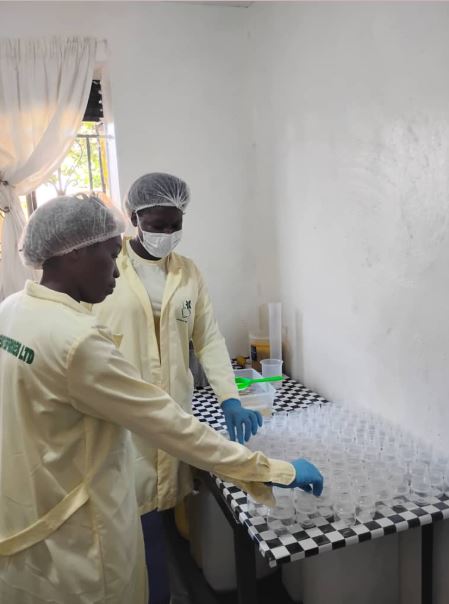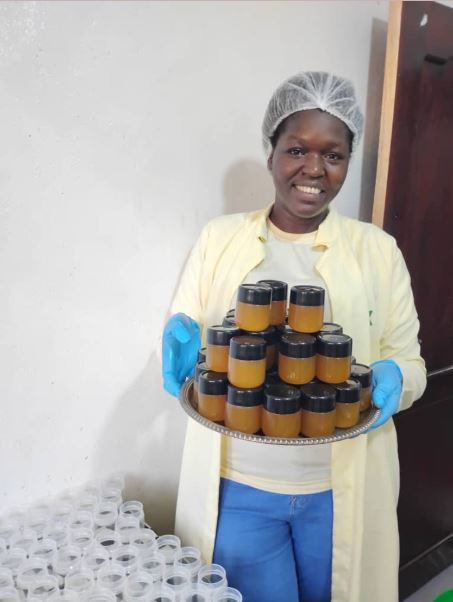
Angellar Babirye is a Ugandan farmer who is touching the lives of several youth through her start-up known as Lamalo Essentials, an entity from which she is minting money through value addition to agricultural produce.
Being one of the icons of agribusiness in Uganda, Babirye shared with the publicisteastafrica.com some of her experiences as an Agripreneur in an exclusive interview and here is her inspiring story;
Qun: Can you please tell us who you are and what drives you?
Ans: I am Babirye Angellar, a passionate Ugandan entrepreneur, founder, and CEO of Lamalo Essentials. I’m driven by the belief that Africa’s natural resources, especially in agriculture, hold the power to transform communities if we dare to add value, think innovatively, and invest in our people.
Qun: Tell us about Lamalo Essentials and how you came up with the idea of starting such an entity.
Ans: Lamalo Essentials was born during COVID-19, and its establishment was based on various reasons. We noticed that in Uganda, thousands of smallholder farmers face significant post-harvest losses due to limited market access and limited storage facilities for their oil-rich seeds like cocoa, sunflower, sesame, castor, moringa, neem, shea nuts, among others. That challenge not only affects their income but also contributes to high levels of agricultural waste. Having identified this gap, we founded Lamalo Essentials, an agro-processing company committed to adding value to these seeds by cold processing them to make organic, healthy, and natural skincare, hair care and wellness products.
We also observed that indigenous seed-bearing trees like neem, castor, and shea were increasingly being cut down for firewood and charcoal, despite their immense environmental and economic potential.
These trees are not only resilient and beneficial to the ecosystem, but also bear seeds that can be transformed into valuable products that promote health and generate jobs.
By protecting and utilising these natural resources sustainably, we are contributing to both environmental conservation and economic empowerment.
Additionally, the Ugandan market is dominated by imported personal care products, many of which contain harmful chemicals and synthetic ingredients.

Qun: How do small-scale farmers benefit from Lamal Essentials?
Ans: Lamalo Essentials bridges these gaps by sourcing directly from farmers, plus creating job and marketing opportunities for small holder farmers, as well as manufacturing high-quality, cold-pressed oils and natural handcrafted products. Our model not only reduces post-harvest losses and environmental degradation but also creates dignified work, supports local economies, and provides consumers with safe, affordable, and eco-friendly wellness alternatives.
Qun: Who or what inspired you to join agribusiness?
Ans: Growing up and being raised by a single mother, I watched my mother work incredibly hard to provide for us, and her resilience planted a seed in me to build something meaningful for my community. I saw an opportunity in agroprocessing not just to make a profit, but to make a difference in the lives of other people. We use cold-press techniques and traditional African knowledge to craft oils and soaps that are good for people and kind to the environment.
Qun: What are some of the products you have under Lamalo Essentials?
Ans: We produce cold-pressed oils like sesame oil, sunflower oil, moringa oil, nilotica shea butter, neem oil, cocoa butter, castor oil, and oyster nut oil. On top of that, we also use the same oils to make natural handcrafted soaps like Africa Soap and Dogwash Soap, all made with love and sustainability in mind. Each product tells a story of our land, our farmers, and the power of going natural. Our products are eco-friendly because no chemicals or synthetic ingredients are added to them.
Qun: Why did you choose to venture into agriculture, a sector most youth are hesitant to venture into it?
Besides, agriculture is the backbone of our continent, yet many young people see it as outdated or unprofitable. But for me, I saw potential untapped gold in our soils.
I realised that the missing link was value addition. When you process what we grow into finished products, you increase their worth, create jobs, and open up new markets. I wanted to challenge the narrative and show that agribusiness is not only viable but also exciting, fulfilling, and deeply impactful.
Qun: What you are doing is value addition; how did you come up with the idea?
Ans: It started with a simple observation; our farmers were making post-harvest losses from their produce (seeds), and the market for their produce was low. Besides that, they were selling raw products at very low prices, while imported finished products dominated our shelves. So, I asked myself, “Why can’t we make our own high-quality, branded products right here in Uganda?” That question became a mission. I began learning about cold-pressing oils and soap-making through online research, experimenting in small batches, and slowly building a brand that could stand on its own in both local and international markets.
Qun: What crops do you work with, and what are some of the unique challenges and opportunities associated with them?
Ans: We mainly work with sunflower, sesame, avocado, oyster nuts, cocoa, moringa, castor, neem, and shea nuts. Each crop has its beauty and its struggles. For example, sunflower and sesame are sensitive to weather, while moringa requires careful post-harvest handling. These seeds are also seasonal, which sometimes becomes challenging. However, they are incredibly rich in nutrients and in high demand across the globe. The biggest opportunity lies in their health and cosmetic benefits, which many people are beginning to appreciate, especially when they’re naturally processed.

Qun: How do you manage risk in your agribusiness, particularly with regard to weather, pests, and diseases?
Ans: Risk is part of the journey, but we’ve learned to adapt. We work closely with farmers to promote climate-smart practices. Since we also get seed cakes like neem seed cakes after processing the oil, we sell them back to the farmers at a very affordable price; 1kg goes for Shs1,000. Neem residues are also good insect repellants and good in gardens as organic fertilisers. We also train the smallholder farmers we work with on best farming practices to use to ensure that we fight such challenges in a natural way, without using chemical fertilisers in the gardens. We also diversify our sourcing regions, like in the northern and eastern regions, to reduce dependency on one area. Continuous learning and building strong farmer relationships have helped us stay resilient even when the weather doesn’t cooperate.
Qun: What role do you think policy and regulation play in shaping the agribusiness landscape?
Qun: Policy can either be a bridge or a barrier. Supportive policies like subsidies for agro-processors, better access to certification, and fair trade policies can unlock massive potential. But bureaucracy, lack of access to finance, and unclear regulations can discourage youth and SMEs. I believe policymakers need to work more closely with entrepreneurs to create a more enabling environment for agribusiness to thrive.
Qun: What opportunities or challenges do you see in terms of market access, trade, or export opportunities?
Ans: There’s growing demand for natural, organic African products both locally and internationally. However, access to certification, packaging, and consistent quality can be limiting for small players. We are currently working towards ISO and UNBS certification to open up export doors. With the right partnerships, support, and marketing, African agro-products can compete globally and win.
Qun: What are some of the biggest challenges you face in your agribusiness endeavours?
Ans: Access to affordable finance, reliable, better quality oil, pressing machines, and consistent quality raw materials are some of our biggest hurdles. Building a brand also takes time and resources. But perhaps the biggest challenge is convincing people that products made locally can be of better quality than imported ones. It is also not easy to convince people, especially youth, that agriculture is not dirty work but a smart business.
Qun: What advice would you give to youth who want to engage in Agribusiness?
Ans: The best thing is to know the problem you are solving in your community and find a solution that will turn into a business.
Start small with the available resources, but start now. Find the right networks and groups related with what you do for example being part of programs and organisations like CWEN, PELUM UGANDA, NOGAMU, MKAZIPRENEURS, EINSTEIN RISING, YALI, USSIA and so many others have nurtured us and enable us to grow as a tram and company. Agriculture is a goldmine if you approach it with creativity, patience, and a business mindset.
We need to add value to our agricultural raw materials, and as Lamalo Essentials, we can’t do this alone. We need more youth and entrepreneurs on board.
The youth should know that learning never ends, networking and experimenting are key, and they should never be afraid to fail. The future belongs to bold thinkers who are ready to act and get their hands a little dirty in exchange for impact and opportunity. Agribusiness is not just farming; it’s innovation, value creation, and sustainability.
Lastly, believe in yourself and the idea you have in mind, follow your dreams and visions.
Most youth cry out about high unemployment rates in Uganda, but we can create companies in Africa that can create jobs for future generations, and it all starts with us.
